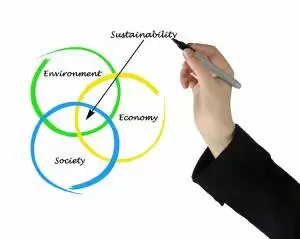
Environmental economics is an area of economics dealing with the relationship between the economy and the environment. Environmental economists study the economics of natural resources from both sides - their extraction and use, and the waste products returned to the environment. They also study how economic incentives hurt or help the environment, and how they can be used to create sustainable policies and environmental solutions.
What Does an Environmental Economist Do?
Environmental economists research the economics of environmental issues such as renewable energy use, construction of new hydroelectric power plants or transnational pipelines, and pollution control measures. They may conduct cost-benefit analyses of industrial activities or proposed regulations involving natural resources, usually using a suite of advanced statistical and computer software programs. They may also run sophisticated environmental modeling programs. Based on these analyses, they may develop cost-effective and sustainable policy recommendations, and communicate them to policymakers through reports and presentations.
Environmental economists may study or develop policy recommendations relating to:
- Externalities, or unintentional effects on the environment or human health resulting from economic activity
- Permit trading, also referred to “cap and trade”. This approach was successfully used to address acid rain in the 1990s. It's also been proposed as a policy tool to address release of the greenhouse gases that cause global warming.
- Cost-benefit analysis of environmental regulations
- The economics of biofuels, waste management, land cleanup and other environmental technologies and industries
- Valuation, which aims to assign dollar values to natural resources. Valuation also deals with nature-provided “ecosystem services”, such as erosion prevention by trees or water filtering by plants.
Where Does an Environmental Economist Work?
As of 2012, the majority of environmental economists were employed in federal or state government, or in professional, scientific, and technical services. However, larger environmental consulting firms are now beginning to hire economists. Professionals in these positions help determine the financial and environmental costs of development projects, and may help project planners mitigate those costs.
Economists themselves may be employed as project managers for development initiatives backed by large organizations such as the World Bank and U.S. Aid. These positions may involve travel to overseas destinations.
What Is the Average Environmental Economist Salary?
While the U.S. Bureau of Labor Statistics (BLS) does not collect data on environmental economists specifically, the median annual wage for economists as a whole was $108,350 as of May 2020. Those working for the finance and insurance industry earned the most during this time, with a median salary of $129,060.*
Environmental Economics Jobs & Job Description
An environmental economist studies and predicts the impact of environmental events on the local, national, and global economic scales. Environmental economics jobs apply field research data to economic incentives and use the resulting models to assess labor, markets, trading, and outcomes. While environmental economist jobs do vary significantly, the list here includes typical job duties that most economists feel comfortable performing:
- Conduct research obtained from literature reviews, sample findings, and computer predictive data
- Analyze historical data and historical issues to formulate an economic theory to explain behavior; apply to current circumstances
- Analyze ecological and economic trends and cycles; use model data to relay information about future trends
- Hypothesize how the environmental event or trend in question causes an economic outcome, and what the impact may be
- Look for the economic incentives that lead people or companies to behave in certain ways
- Look to change economic incentives so that people behave differently toward environmental concerns
- Consult with policymakers in regard to economic pressures that cause people and companies to conform to regulations
- Make predictions by identifying, collecting, analyzing, and using environmental and historical economic information
- Provide reports to external stakeholders on economic performance and outcomes
- Consult with policymakers, industry leaders, and other potential stakeholders
- Prepare reports regarding economic findings
- Assess and assign economic value to an industry or company's tasks, strategies, and past and future outcomes
Senior environmental economist job responsibilities often include managing project teams and departments, budgeting and strategy. Such responsibilities often entail:
- Source and oversee data and concepts from literature reviews, research, and computer model predictive data
- Hypothesize a reasonable value and impact for present actions
- Note and analyze ecological and economic trends and cycles
- Prepare economic hypothetical outcomes to apply to various scenarios
- Act as point of contact for external stakeholders concerned about their economic performance
- Consult with investors, policymakers, and other potential stakeholders on impacts of environmental decisions
- Prepare reports and perform economic modelling
- Assign economic value to a company's tasks, strategies, and past and future impacts/profits that influence the environment and vice versa
- Provide consultation to agencies, professionals, or researchers based on the environmental economy perspective
- Establish workgroup culture for a positive and challenging work environment
- Mentor junior colleagues
What Is the Job Demand for Environmental Economist?
Employment of economists is projected to grow 13% between 2020 and 2030. Many of the new jobs created are expected to be in firms that specialize in research and consulting services.*
While a bachelor's degree is adequate for some positions, applicants without advanced degrees will generally be at a disadvantage in the job market.
What Are Environmental Economist Education Requirements?
Some government positions are available to workers with bachelor's degrees. However, most positions required advanced degrees. The majority of environmental and other economists have doctoral degrees. Graduates must have a strong background in math and statistics. Positions in business often require relevant work experience in addition to a graduate degree. Seek out internships to gain practical experience in economic analysis.
Environmental Economist- Related Degrees
What kind of societies and professional organizations do Environmental Economists have?
- The Association of Environmental and Resources Economists (AERE) http://aere.org/ publishes journals, holds conferences, and offers a job board and membership directory.
- The American Economic Association (AEA) https://www.aeaweb.org/ is the foremost association for economists in the United States. It publishes academic journals, organizes the Econlit database, holds an annual conference, offers webcasts, and maintains a list of links to economic data and resources.
Related Degree: Applied Economics Master's Degree Online
Applied economics differs from standard economics in that it focuses strongly on economics in practice. Students will take the theories, processes, tools and mechanics of the theory they learned previously and apply them to real or conceptual scenarios. Applied economics work in the frontline of businesses, government and planning to examine the viability and costing of projects, ensuring the most efficient use of resources.
*2020 US Bureau of Labor Statistics salary figures and job growth projections for economists reflect national data not school-specific information. Conditions in your area may vary. Data accessed September 2021.





